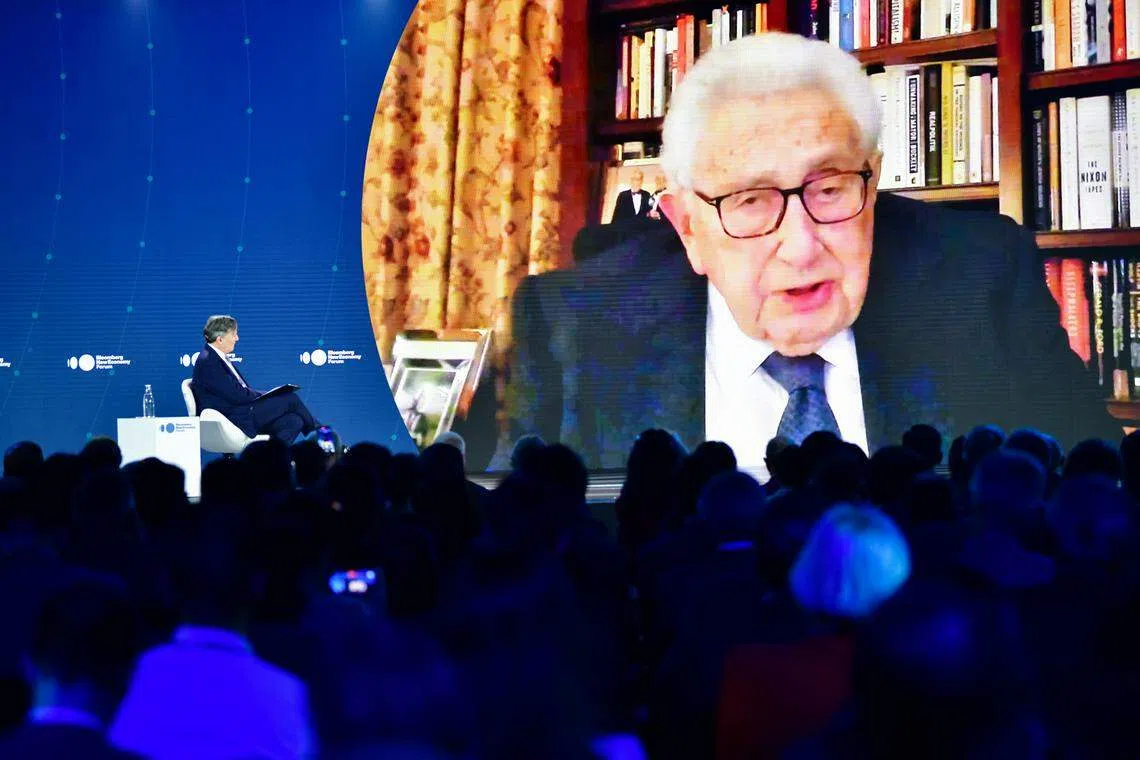Economic interdependence between US and China aids national security too: Tharman

Sharon See
ECONOMIC interdependence between the United States and China is valuable for national security, as a safer alternative than a world that is decoupled, Singapore’s Senior Minister Tharman Shanmugaratnam said on Tuesday (Nov 15).
“No one can be naive about national security anywhere, and it requires some restrictions on economic activity, some components, some software, some investments,” he said on the first day of the Bloomberg New Economy Forum at Capella Singapore, making reference to US semiconductor export controls targeting China.
Yet “an economically interdependent world and an economically interdependent US and China is also in national security’s interest”, he said.
A world in which the US and China were decoupled in trade, investment, data, payments, financial systems and intellectual property creation would be a “profoundly dangerous” one, Tharman said: “Interdependency is not going to assure us of peace – there’ll be constant friction – but it’s much safer than a world that’s decoupled.”
Therefore the more overlapping trading alliances there are, the better, he said, adding that countries must “hold out hope” that both China and the US would eventually join them.
More broadly, major world issues such as climate change, pandemic preparedness and growth are areas of “mutual interest that we have to collaborate on”, he said. “That itself forms an overarching relationship between the major powers who would otherwise be obsessed with competition and obsessed with what divides them.”
Navigate Asia in
a new global order
Get the insights delivered to your inbox.
He told forum participants to recognise that China is not the Cold War-era Soviet Union. While some countries may slow the development of China’s capabilities, such as in semiconductors, they cannot prevent China from emerging as a major player in the global economy and technology space.
“The question is whether you eventually want China, a formidable economy, to be distrustful of you, to be in a relationship of antagonism,” he said.
Touching on the global economy, Tharman said the world must now look at issues “through a lens that is not driven by forecasts but by an appreciation of risk and uncertainty”.
Central banks “bet on the wrong side of the range of possibilities a year ago”, he said – and the price of misreading the risk of inflation is a recession.
Instead of betting on the upside, economic or corporate decision-making should prepare for what can go wrong, which means investing in advance and “at a high level for a much longer period of time” rather than waiting for crises. This applies to investments in energy security, food security, agricultural efficiency, pandemic prevention and potential growth.

In an earlier session at the event, Henry Kissinger, former US Secretary of State and National Security Advisor, said he was more optimistic about US-China relations now than a year ago.
Asked if this was because of Monday’s meeting between US President Joe Biden and Chinese President Xi Jinping, Dr Kissinger said there was concrete discussion on important topics such as climate change and the global economy, but that these are “not controversial in their objectives”.
In the months ahead, he said, open dialogue between the two on challenging topics – such as the South China Sea, the specifics of economic competitiveness and how to limit emerging weapons that combine artificial intelligence with great destruction – would “make a big contribution”.
As for the Russia-Ukraine war, Dr Kissinger laid out three conditions for it to end: key participants must decide to do so; Ukraine must be allowed to emerge as an independent country protected by close ties with Europe; and Russia should be brought into the European system to build a relationship based on equality and mutual respect, similar to Germany after World War II.
However, he said it would be more difficult to get through to Russia than to China, as the basis of a consensual dialogue has not yet been laid.

During the opening address of the forum, Chinese Vice-President Wang Qishan signalled China’s willingness to work with the US on areas of mutual interest, following the Biden-Xi meeting.
“We hope the US side will work with China in the same direction, uphold the principles of mutual respect, peaceful coexistence and win-win cooperation and bring bilateral relations back to the world’s track,” said Wang, adding that countries need to cast aside “Cold War mentality”.
Decoding Asia newsletter: your guide to navigating Asia in a new global order. Sign up here to get Decoding Asia newsletter. Delivered to your inbox. Free.
Copyright SPH Media. All rights reserved.

